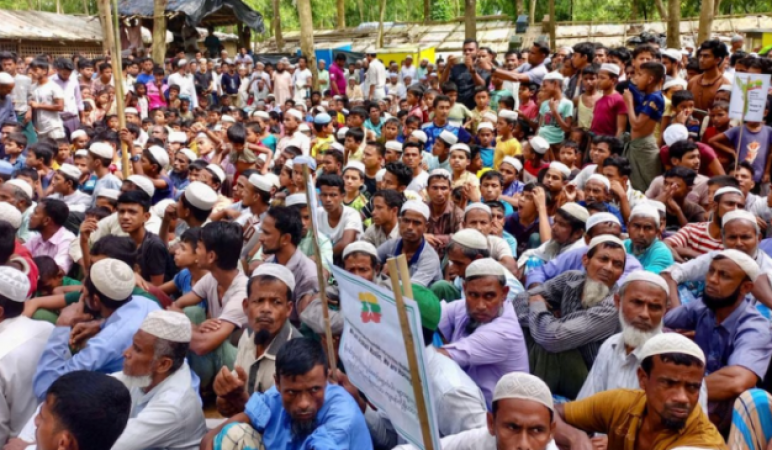
Dhaka: Following a renewed UN call for the safe and sustainable repatriation of the persecuted minority to their country of origin, Rohingya activists in Bangladesh are urging the international community to exert more pressure on Myanmar.
Following a military crackdown in 2017 that resulted in thousands of deaths and the displacement of hundreds of thousands from Rakhine State, Rohingya Muslims and other minorities in Myanmar have endured decades of systematic discrimination and persecution.
The UN Human Rights Council was among the most recent to urge the Naypyidaw government to establish "conducive conditions for the voluntary, safe, dignified and sustainable" repatriation when it adopted a resolution on the Rohingya and other minority groups in Myanmar earlier this month.
Also Read: South of Sudan's capital is engaged in combat after generals briefly reappear
Mohammed Rezuwan Khan, a Rohingya rights activist in Cox's Bazar, told Arab News this week that the international community should exert much more pressure on the Myanmar government in order to ensure sustainable repatriation.
"We are all Rohingya, and we want to go home. However, the environment in Rakhine ought to be favorable. If we go back now, the Myanmar government will treat us badly once more.
Khan is one of more than a million Rohingya refugees suffering in Bangladeshi refugee camps, which have long hosted and supported them despite Bangladesh not being a signatory to the 1951 UN Refugee Convention.
Also Read: Erdogan and Netanyahu will meet in Turkey three days after Abbas's visit
As international aid to the Rohingya community has been declining since 2020, the developing nation spends an estimated $1.2 billion annually to support the community. As a result of unanswered requests for donations, the UN World Food Programme reduced the group's food rations earlier this year.
As they look for assurance about their future, the Rohingya community in Cox's Bazar is suffering, according to Khan.
He made reference to the lack of educational and employment opportunities for the community when he said, "If we are forced to live here for a longer period of time, it will create a lost generation of Rohingya."
According to Khan, the Rohingya in Myanmar believe "they are not safe enough," and those in Bangladesh believe "they are not safe enough" as a result of an increase in crime in the camps.
According to Khan, there is constant unease among the group. "We don't want to continue living here because we don't know when or by whom I would be killed. We request that the world community work to find a long-term solution to the Rohingya crisis.
More and more Rohingya risk dangerous boat crossings to leave Bangladesh and travel to places like Malaysia and Indonesia. According to the UNHCR, more than 3,500 people attempted perilous sea crossings in 2022.
No real progress has been made despite numerous plans over the years for the Rohingya to return to Myanmar. The most recent attempt involved Bangladeshi officials and leaders of the local refugee community traveling to Rakhine State in May to look into the viability of repatriation.
Accountability is crucial, according to Mohammad Jubaer, chairman of the Arakan Rohingya Society for Peace and Human Rights in Cox's Bazar.
The international community should guarantee certain accountability issues, such as respect for human dignity and safety. There should be a safe zone maintained by the international community where we will be living in Myanmar.
If not, the Myanmar government will once more send us to Bangladesh under duress, Jubaer told Arab News.
"The Rohingya persecution problem is not the only problem. The protection of all other ethnic minority groups in Myanmar is necessary, he said.
"To ensure this, the international community should put more pressure on Myanmar."
The Rohingya issue places "ethical responsibilities" on developed nations and intergovernmental organizations, according to Mohammed Nur Khan, a Bangladeshi rights advocate and migration specialist.
Since they are in a better position than most people in terms of their financial and political situation, ethically speaking, more responsibility falls to them. They can start by opening the dialogue on the UN platform. It's crucial," Khan said to Arab News.
"Secondly, they can use various tactics, such as enforcing economic sanctions and others, to force the Myanmar junta to create a favorable environment. The international community ought to actively participate in regional organizations like ASEAN, he said.
The most recent UN resolution, according to Khan, may encourage the Myanmar government to make more efforts to improve conditions in Rakhine State, but Khan is doubtful that it will effectively create a welcoming environment for the Rohingya.
Also Read: Iraq's reservoirs are running dry, and water levels have never been this low
The UN resolution comes after prominent visitors, including OIC Secretary-General Hissein Brahim Taha and Chief Prosecutor of the International Criminal Court Karim Khan, visited refugee camps in Bangladesh.
"But even if it takes some time, it should be done. It wouldn't be wise for us to repatriate the Rohingya unless we made this assurance. I don't believe that Rakhine's current circumstances are conducive to ensuring that anyone can live in security.